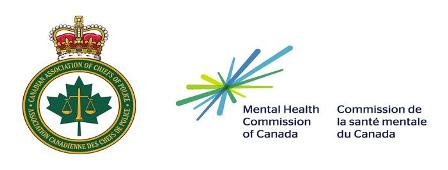 Improving interactions and outcomes between persons with mental illnesses and the police was the focus of a national conference between mental health and law enforcement leaders in Toronto. “Balancing Individual Safety, Community Safety and Quality of Life,” was jointly hosted by the Mental Health Commission of Canada and the Canadian Association of Chiefs of Police the week of March 24, 2014. The purpose of the conference was to share ways on how to reduce and improve interactions between persons with mental illnesses and the police, as well as explore ideas to reduce stigma and create a consistent training module for police officers when dealing with individuals who have mental health issues.
Improving interactions and outcomes between persons with mental illnesses and the police was the focus of a national conference between mental health and law enforcement leaders in Toronto. “Balancing Individual Safety, Community Safety and Quality of Life,” was jointly hosted by the Mental Health Commission of Canada and the Canadian Association of Chiefs of Police the week of March 24, 2014. The purpose of the conference was to share ways on how to reduce and improve interactions between persons with mental illnesses and the police, as well as explore ideas to reduce stigma and create a consistent training module for police officers when dealing with individuals who have mental health issues.
The conference took place in a city and province where there has been significant exposure about the issue of police interactions with individuals in mental health crisis. Earlier this year, a coroner’s jury made more than 70 recommendations in an inquest about the police shooting deaths of three individuals with mental health issues. And in the summer of 2013, public outrage boiled over when police fatally shot 18-year-old Sammy Yatim on board a public transit streetcar .

CMHA Ontario CEO Camille Quenneville has applauded the coroner’s jury recommendations and remains one of the mental health leaders who has spoken out about the issue of mental health and policing. Furthermore, CMHA Ontario, through its partnership and policy work support to the Provincial Human Services Justice Coordinating Committee (HSJCC). The Provincial HSJCC has produced several reports on police interactions with mental health services and hospitals including:
- An Info guide outlining the key issues relating to mental health apprehensions and police accompanied visits to the emergency department (ED), and highlighting strategies for effective police-ED protocols in Ontario. Currently in Phase 2, CMHA Ontario is developing provincial police-ED protocol recommendations to inform the Ministry of Health and Long-Term Care.
- A critical review of Joint Police/Mental Health collaborations in Ontario which identifies innovative practices, successes and challenges. For example in the Hamilton, Halton, Peel and the Chatham-Kent areas the Crisis Outreach and Support Team (COAST) program – a mobile crisis intervention team consisting of multidisciplinary mental health workers (social workers, nurses, etc.) and specially-trained, plain-clothed police officers that co-respond to mental health crises in the community – has been shown to be effective.